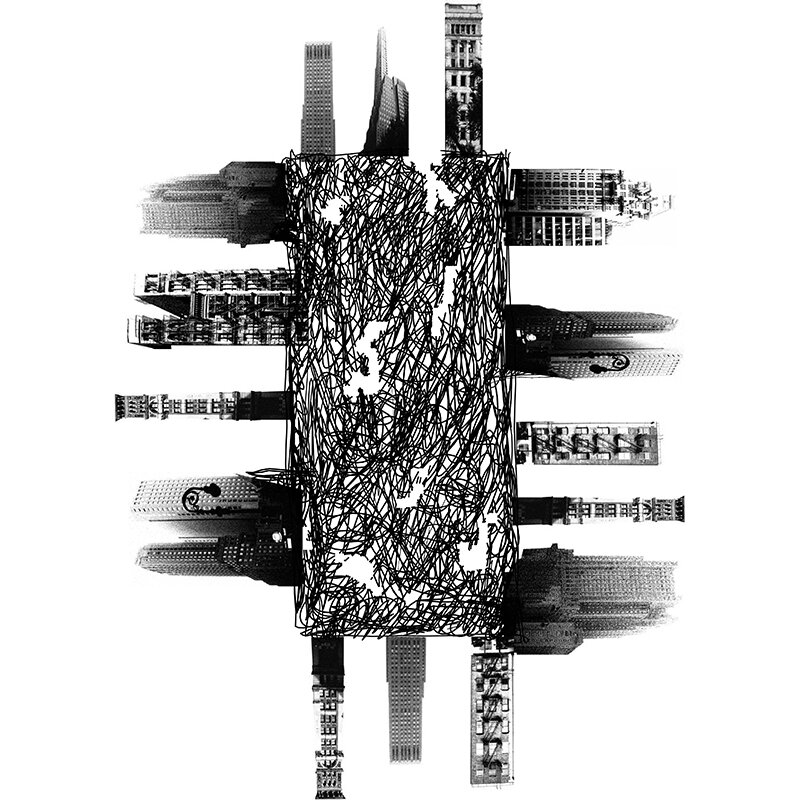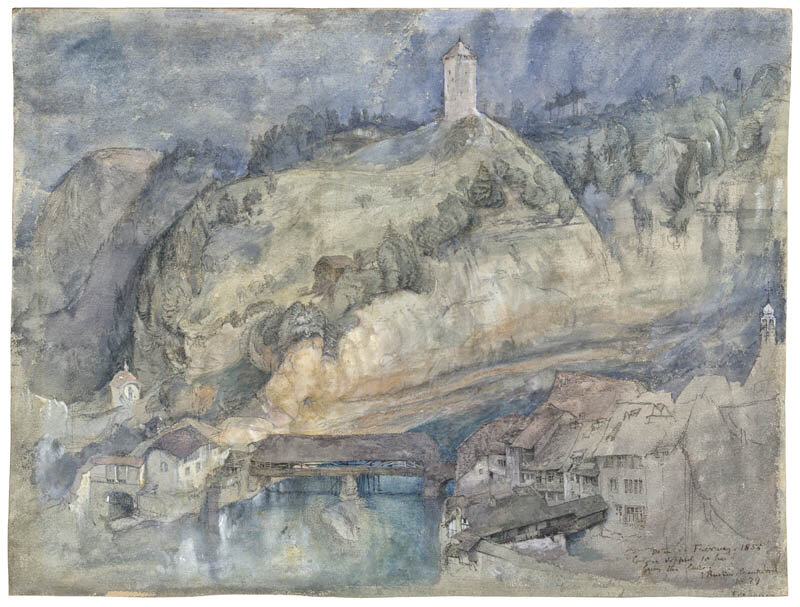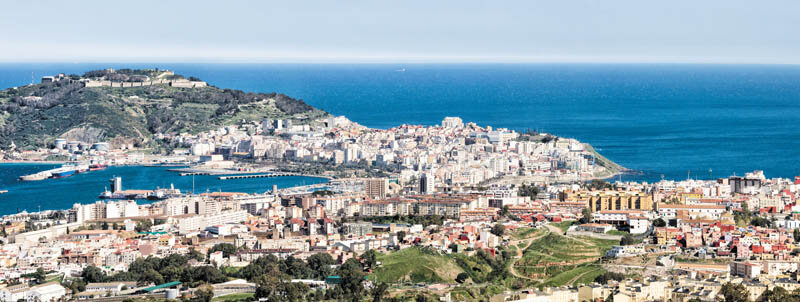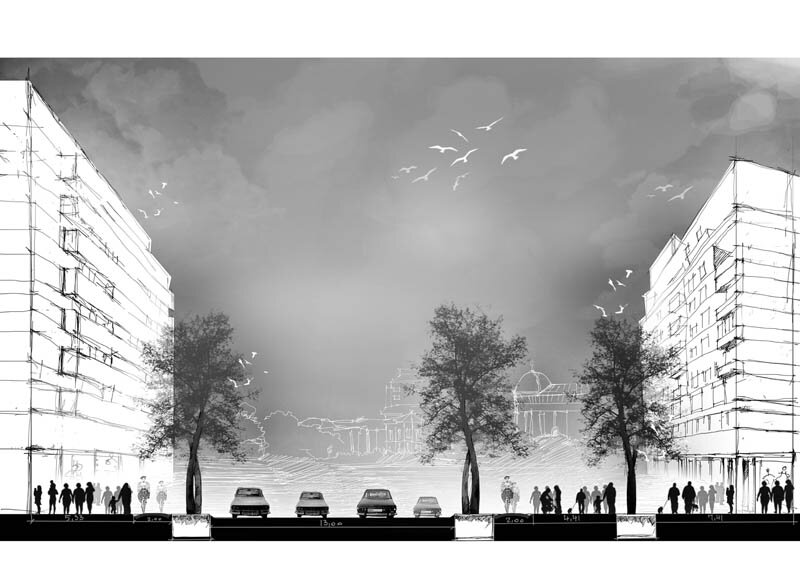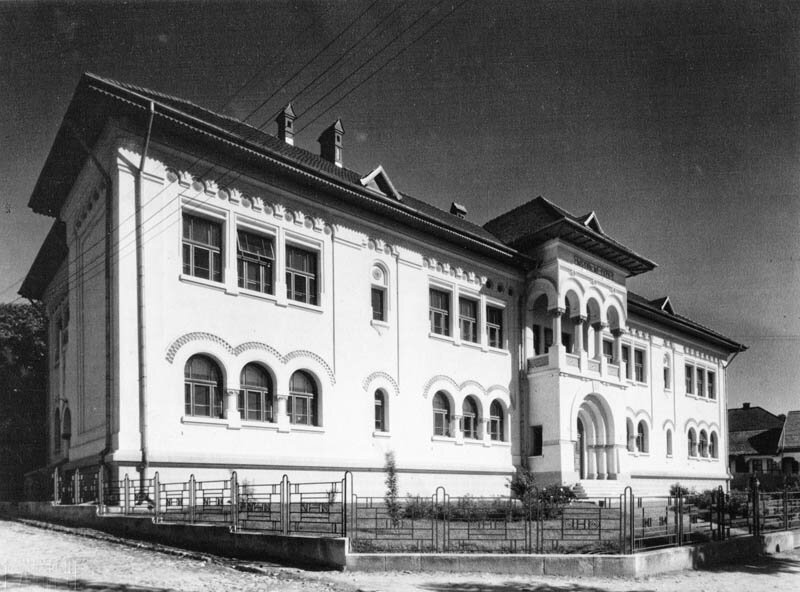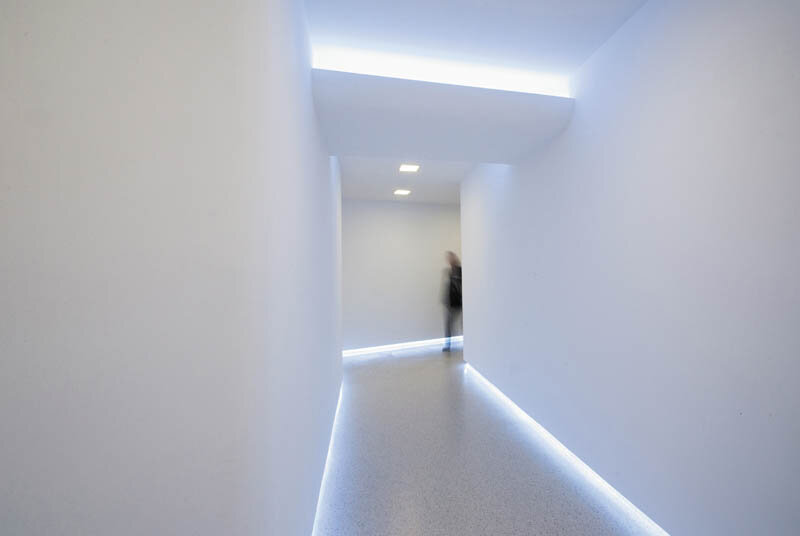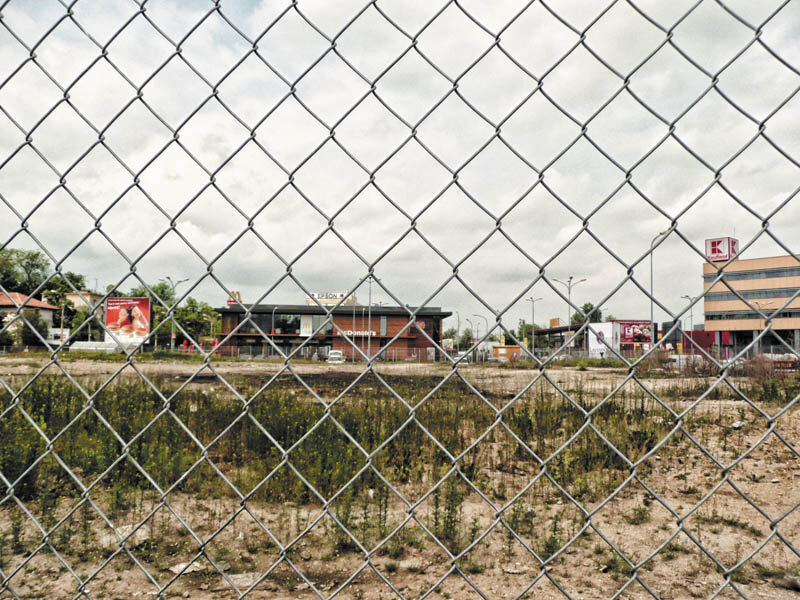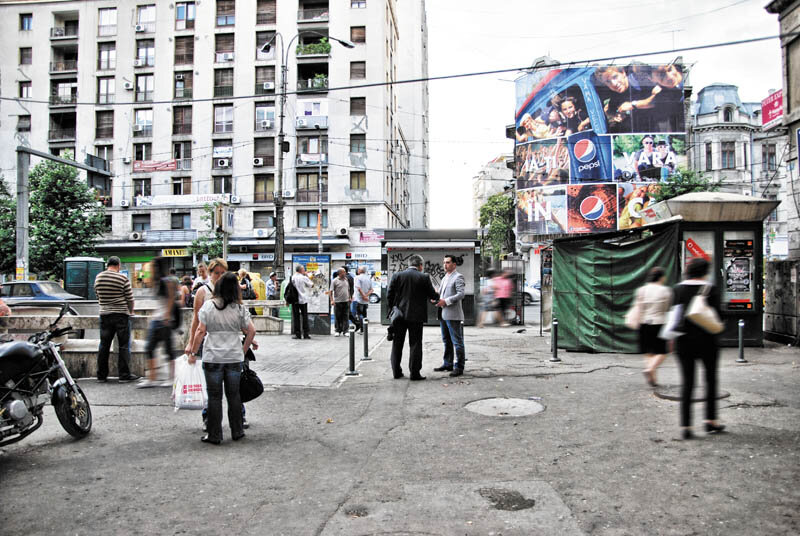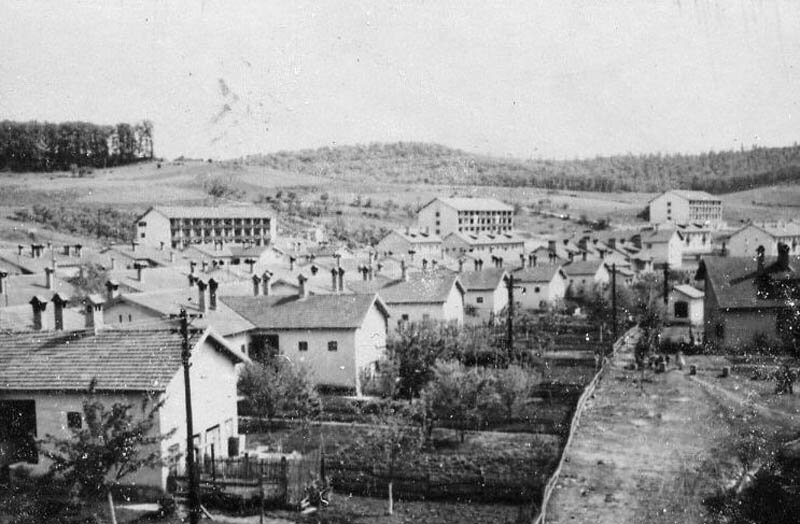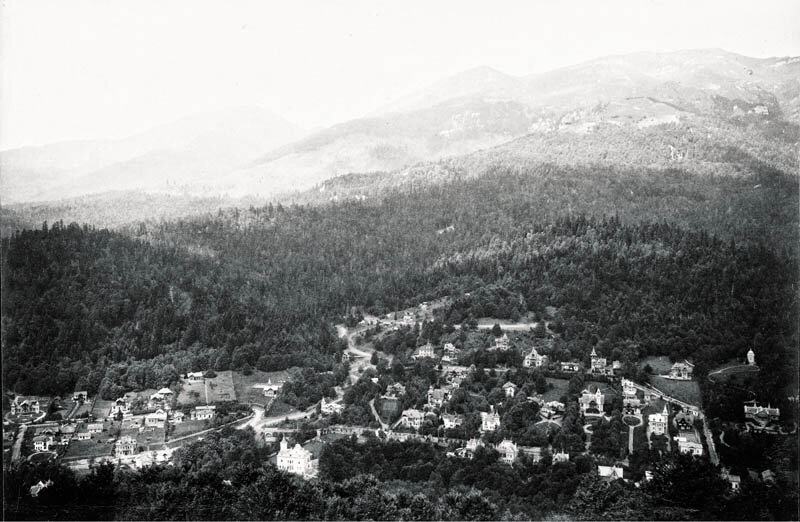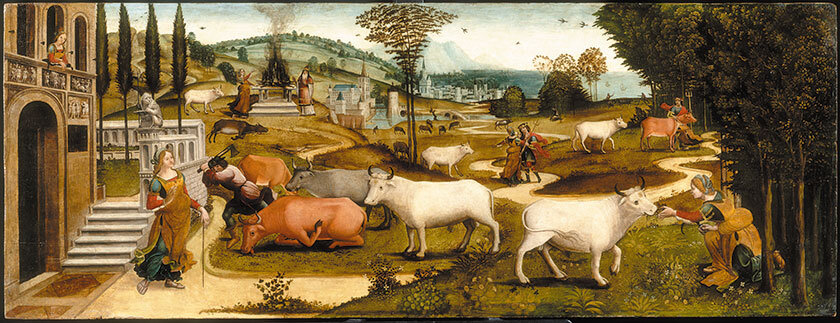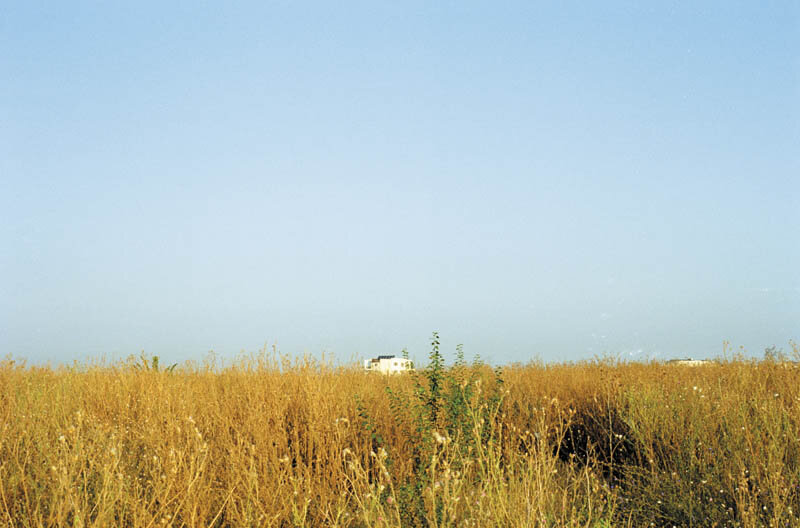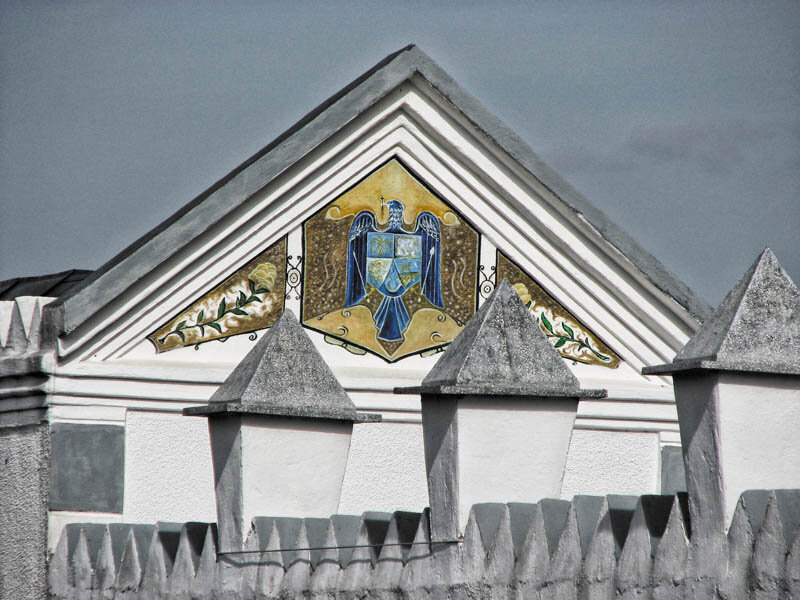
Entzauberung și re-Zauberung

Entzauberung and re-Zauberung
| Unde ești, frumoasă lume? Revino, Divină epocă de aur a naturii! Vai, numai în lumea nimfelor din cântec Mai trăiește fabuloasa-ți urmă. Câmpurile își deplâng pieirea Nici un zeu nu mi se-arată. Vai, dintr-un peisaj de viață și căldură Ne-a mai rămas doar umbra.1(Friedrich Schiller, Zeii Greciei) |
| Punct și contrapunct în estetica peisajuluiDe când Piața Universității a trecut și ea prin pietonalizarea cu pavaj continuu cum se poartă acum, am văzut că poeții advertisingului o numesc „poiană urbană”. Văd aici o ilustrare perfectă a vechii și ireconciliabilei tensiuni dintre urbanitate și natură; dintre artificializarea planetei noastre suprapopulate și prearomânescul Sehnsucht, adică dorul de condiția edenică primordială.
Atât pavarea, cât și metaforizarea acestui spațiu public s-ar putea înscrie în termeni para-romantici ca „peisajare” sau chiar puțină „re-magifiere” - pentru că așa cum nu e om să nu fi scris o poezie, nu e om să nu fi asociat peisajul natural cu magia sitului paradisiac. Măcar odată-n viața lui. Însăși sintagma „peisaj urban” conține o intenție de încălzire a imaginii unui ambient prea antropizat de modernitate, numit prozaic „mediu urban”. Pietonalizarea pieței recheamă memoria idealizată a orașului medieval, iar poienificarea ei trezește simțirea la farmecul naturii. Sunt „clasicele” evadări romantice, cum ar fi. În paranteză fie spus, sunt exact cele două asocieri cu care azi ne salvăm și arhitectura: cu istoria și cu natura. Da, lumea e plină de binarii, printre care și „magifierea” și „de-magifierea”. Entzauberung - des-fermecarea - a fost termenul lui Schiller, care deplângea părăsirea naturii de către zei. Dar nu Schiller a încercat s-o magifieze la loc, pentru că el nu era un romantic. (Idealurile clasice n-aveau oare și ele o natură romantică? Dar nu ne cufundăm acum în substraturi telurice schlegeliene.) El era cu armonia, eventual cu armonizarea binariilor. Reanimarea naturii autentice aveau s-o înfăptuiască romanticii en titre. Înaintea lor însă, prima re-magifiere a încercat-o Capability Brown, în amenajarea domeniilor englezești. El a fost cel care, după proba de înaltă compoziție a lui le Nôtre, dar mai ales după geometrizarea frunzișului din întreaga Europă aristocratică, a pornit dez-grădinizarea peisajului. N-a făcut-o, cred, zgândărit de vreun nerv al competiției contra-latine, ci din sinceră simțire anglo-saxonă, sătulă de-atâta lumină a rațiunii infiltrată până-n cele mai intime unghere ale firii2. Și fără să-și fi pierdut rațiunea. Dar nici lui Adam nu i-a fost dat să lâncezească o veșnicie în Rai. Tocmai când lumea își odihnea mulțumită privirea asupra parcurilor peisagere cu dune înierbate unde pășteau vaci, asupra iazurilor unde se adăpau căprioare, a ruinelor bântuite de prigorii și a pâlcurilor de copaci unde cântau privighetori, au început primele săgeți ale criticii să tulbure pacea. De exemplu, un poet al vremii declara că și-ar dori să moară înaintea lui Capability, ca să apuce să vadă Raiul înainte de amenajare. Iar după moartea bietului om, romanticii îi calificau parcurile drept plicticoase încercări de reproducere a Raiului pe Pământ. Se vede că îi lipsea exaltarea romantică, îi lipsea frisonul sublimului acestui Amability Brown. De-acum încolo, peisagistica avea să urmeze un destin frământat de contrarii. Semidesprinsă fiind din marea casă a arhitecturii, a balansat și ea între înaltul simțirii și virtutea lucidității, precum arhitectura între formă și funcțiune. |
| Citiți textul integral în numărul 5/2013 al revistei Arhitectura |
| Note:1 Traducerea mea liberă după Zeii Greciei, de Schiller - la care apare prima dată termenul de Entzauberung. Termenul a fost preluat de științele sociale și utilizat în sensul de desacralizare a vieții moderne (eng. disenchantment, fr. désenchantement).
Die Götter Griechenlandes Schöne Welt, wo bist du? Kehre wieder,/ Holdes Blütenalter der Natur! / Ach, nur in dem Feenland der Lieder / Lebt noch deine fabelhafte Spur. / Ausgestorben trauert das Gefilde, / Keine Gottheit zeigt sich meinem Blick. / Ach, von jenem lebenwarmen Bilde / Blieb der Schatten nur zurück. 2 Contemporanul lui, Lessing purta și el, independent, o luptă împotriva imitării stilurilor franțuzești și o reorientare mai degrabă către studiul lui Shakespeare, mai potrivit spiritului anglo-german. |
| Art thou, fair world, no more? Return, thou virgin-bloom on Nature’s face; Ah, only on the minstrel’s magic shore, Can we the footstep of sweet fable trace! The meadows mourn for the old hallowing life; Vainly we search the earth of gods bereft; Where once the warm and living shapes were rife, Shadows alone are left.1(Friedrich Schiller, The Gods of Greece) |
| Point and Counterpoint in the Aesthetics of Landscape Ever since Universității Square became a pedestrian area made of continuous pavement, as it is the fashion these days, the poets of advertising have been referring to it as to the “urban clearing”. To me, this is a perfect illustration of the old irreconcilable tension between urban life and nature, between the artificialization of our overpopulated planet and the all too Romanian Sehnsucht, i.e. the longing for the primordial Edenic condition.
This public space’s paving and metaphorical treatment could both be described in para-Romantic terms as “landscaping” or even a little bit of “re-magicking”, because, as there isn’t a man who hasn’t written a poem in his life, there also isn’t a man who hasn’t associated natural landscape with the magic of the paradisiac site at least once in his lifetime. The very phrase “urban landscape” contains an intention to warm the image of an ambiance that modernity has rendered too anthropic and prosaically called “urban environment”. The pedestrian works made to the square recall to one’s mind the idealized memory of the medieval town, and its new clearing-like appearance awakens one’s sensitivity to the charm of nature. These are the “classic” Romantic exits, as it were. Between you and I, these are exactly the two associations which manage to safeguard architecture today: history and nature. Yes, the world is full of binaries, among which “magicking” and “de-magicking”. Entzauberung - dis-enchantment - was the term chosen by Schiller, who deplored the gods’ departure from nature. But it wasn’t Schiller who tried to magick it back again, because he was not a Romantic. (Wasn’t there a Romantic side as well to classic ideals? But let us not delve right now into the telluric Schlegelian depths.) He was an advocate of harmony, possibly of the harmonization of binaries. The revival of authentic nature was to be achieved by the Romantics proper. However, before them the first re-magicking was tried by Capability Brown, in the process of arranging the English domains. After the remarkable composition that was le Nôtre, but especially after bringing parks throughout the aristocratic Europe under the government of geometric rules, he started to de-garden the landscape. In my opinion, in this endeavor of his, he was not driven by any desire to counteract the Latins, but by pure and honest Anglo-Saxon feelings, saturated with so much light of reason penetrating into the deepest corners of one’s mind2. And he did it without losing his reason, too. But Adam himself was not destined to linger for ever in Heaven. Precisely when people were resting their eyes contentedly on the green landscapist parks with grazing cows, on the deers taking water from the ponds, the ruins visited by humming birds and the clumps of trees harboring the warbling nightingales, the first critics began to make sharp comments and trouble that peace. For instance, a poet of the times stated that he would like to die before Capability, so that he would be able to see Heaven before refurbishment. And after the death of the poor man, the Romantics began to call his parks boring attempts at reproducing Heaven on Earth. Clearly, this Amability Brown was devoid of Romantic exaltation and the thrill of the sublime. From that time onward, landscapin would have a troubled destiny torn between contraries. Half detached from the great house of architecture, it has been vacillating between the high noble feelings and the virtue of lucidity, just like architecture between form and function. |
| Read the full text in the print magazine. |
| Notes:1 My free translation of The Gods of Greece, by Schiller, where the term Entzauberung first appears. Such term was taken over by the social sciences and used with the meaning of desacralization of modern life (in English disenchantment, fr. désenchantement).
Die Götter Griechenlandes Schöne Welt, wo bist du? Kehre wieder,/ Holdes Blütenalter der Natur! / Ach, nur in dem Feenland der Lieder / Lebt noch deine fabelhafte Spur. / Ausgestorben trauert das Gefilde, / Keine Gottheit zeigt sich meinem Blick. / Ach, von jenem lebenwarmen Bilde / Blieb der Schatten nur zurück. 2 His contemporary, Lessing, was fighting his own battle against the emulation of French styles and in favor of turning rather to the study of Shakespeare, more appropriate for the Anglo-German spirit. |

